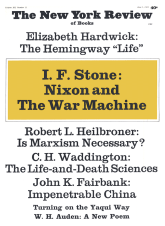In response to:
Nixon and the Arms Race: How Much Is "Sufficiency"? from the March 27, 1969 issue
To the Editors:
I.F. Stone’s installment in the March 27 Review in his series on the American military establishment is a superior piece of reporting against which the Pentagon (even assuming it wished to) would find it next to impossible to marshal a parity of contradicting facts. But the piece lacks, so to speak, a “sufficiency” in exploring the question of where the latter term came from as related to the measurement of our nuclear arsenal.
Mr. Stone correctly bestows on me this dubious honor of feeding to President Nixon, at his first White House news conference January 27, the term sufficiency, which he hungrily accepted as more desirable than superiority or parity in describing what we should be aiming for in our weapons posture vis-à-vis the Soviet Union. But not only was I guilty of sloppy homework in wrongly indentifying Henry Kissinger as the father of sufficiency, neither Stone nor I, in retrospect, identified the man who perhaps deserves more credit than anybody in pressing the question of how many nuclear warheads are enough.
It was, of course, Daniel Lang who raised the question in his book, An Inquiry into Enoughness—a collection of articles which first appeared in The New Yorker. Since the Atomic Age began, Lang has distinguished himself in reporting the ramifications, more sinister than otherwise, of letting the genie out of the bottle.
When Mr. Stone called me, a day or two after the news conference, to ask if I had been able to remember the correct source for the magic word, sufficiency, I was obliged to confess that I still wasn’t sure, though several reminders had been volunteered and I ticked them off to him.
Defense Secretary Laird, at a news conference of his own had already claimed it for another Republican, Donald A. Quarles, an Eisenhower Secretary of the Air Force. (Stone’s article reported the irony of that citation which, including the irony, I had forgotten completely.)
It seemed quite possible that I had picked up the sufficiency term from a recent, excellent paper by George Rathjens (also mentioned in the March 27 Stone piece.)
Meanwhile Ralph Lapp called to remind me that he had dealt with sufficiency in his book, The Weapons Culture. Lang, who has a high tolerance for the carelessness of his friends, did not call, but Robert Kleiman, an editorial writer for The New York Times and a mutual friend, did, to chide me gently for not remembering Lang’s “Inquiry” and giving him credit.
During our phone conversation I mentioned the book (published by McGraw-Hill four years ago) to Stone and urged him to read it, adding, I think, that subliminally at least, it must have been my major source of inspiration. Then I reread myself Lang’s last chapter which deals with Enoughness, a term he preferred as more singular, more thought-provoking, than sufficiency. It contributes some refreshing clarity to the turgid dialogue over ABM and other items.
“Given the nature of these weapons,” Lang wrote, “I have been asking myself, is it reasonable to imagine that a country can reach the point of deciding that its arsenal is strong enough to see it through any crisis—of feeling that it need no longer concern itself with the comparative strength of rival powers? In short, is it reasonable to imagine that Russia or the United States could choose to resign unilaterally from the present arms race? While the question might apply to either nation, it probably makes more sense to address it to the stronger of the two—which, according to all the intelligence reports that our leaders believe in, is our own.”
But everybody, it seemed, had a different interpretation of the meaning of enoughness, even though Alain Enthoven (who has just left the Pentagon after serving as Assistant Secretary of Defense for Systems Analysis) told Lang that “it isn’t true, as many people seem to think, that the more weapons we have, the stronger we are.”
And, based on his testimony before Senate committees last [month] and other statements, Melvin Laird seems to have devised his own definition of enoughness—enough of a sufficiency in our nuclear arsenal to guarantee superiority, whatever that may mean.
Edward P. Morgan
Chief Correspondent,
Public Broadcast Laboratory
Washington, D.C.
This Issue
June 5, 1969



